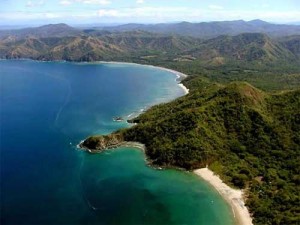Dickinson to Durban » Climate Change, Environmental Justice, Environmental Politics, Key COP17 Issues, Mosaic Action, Student Research » Costa Rica: “The beacon of common sense”
Costa Rica: “The beacon of common sense”
By Anna McGinn ‘14
The Climate Vulnerability Forum (CVF) is a group of countries that group themselves together, not as an additional negotiating block, but as a group of countries with a common interest in protecting the most vulnerable countries of the world. The first meeting of this group was held in 2009 in the Maldives before COP15. They continue to meet every year before the COP to solidify their shared perspective on the negotiations. Yesterday, I attended a side event on the Forum during which ministers of resources and environment from Rwanda, Bangladesh, the Maldives and Costa Rica spoke on the issue of climate change for their countries and the group as a whole.
While most of the countries that are members to the Forum identify as the most vulnerable countries in the world. They are the low lying countries, the island countries, the rain fed agricultural countries, the dry countries who do not have the capability to rebound from climatic changes. Bangladesh, Rwanda, and the Maldives are among these countries. Interestingly, the Costa Rican minister articulated different reasoning for participating in the Forum. He stated that Costa Rica has altruistic reasons and selfish reasons for supporting the CVF. First, to Costa Rica, a country without an army and with a large focus on human rights, climate change is not so much an economic or even environmental issue as much as a human rights issue. They are not willing watch as 5 to 15 percent of the countries in the world are wiped out by climate change. Their “selfish reason” is that they will suffer significantly from climate change. Currently, Costa Rica is loosing one percent of their GDP annually to rebuilding from climate related disasters and adapting to climate change. To put this in perspective, this is close to the amount of money that Costa Rica puts into their public universities. They realize that it is financially in their best interest to develop sustainably and encourage others to do the same. Looking forward, Costa Rica hopes to reach zero emissions by 2031 because they want to show the world that it is possible.
This type of leadership and acknowledgement of the human issues involved with climate change is essential to the success of these negotiations. Arguably, it is easier for Costa Rica to support the most vulnerable countries and look to the long term because their domestic government functions in a similar way, yet it is essential that other countries begin to look at climate change through a similar lens. Although the ministers were relatively positive about their goals for mitigation and adaptation, they are grounded in the reality that other countries will not begin to think in a similar manner. They know that they are going to have to help themselves because, as the minister from the Maldives said, “countries in this group are not in a position to influence the big countries.”
They concluded with remarks from each minister that revolved around the need for the CVF to take the next step by taking action. They have united their voices, but now it is time to share plans, build capacity, and do all they can to save their countries. The sense of urgency in the room during this event reflects what I believe should be present in the plenary and the negotiations. Unfortunately, no CVF member has the ability to instill this in the negotiations as a whole which is extremely problematic. There is not more time to waste; yet countries continue to put off commitment to action.
Filed under: Climate Change, Environmental Justice, Environmental Politics, Key COP17 Issues, Mosaic Action, Student Research · Tags: Bangladesh, Cimate Vulnerability Forum, climate justice, COP17, costa rica, rwanda, the Maldives









Recent Comments